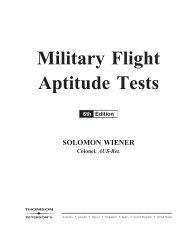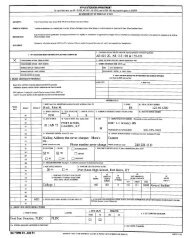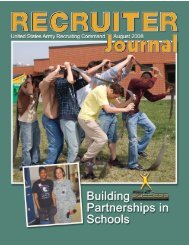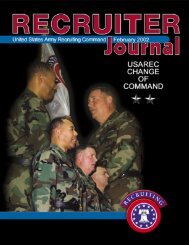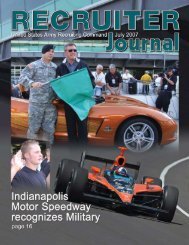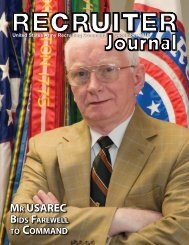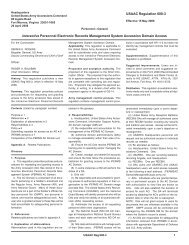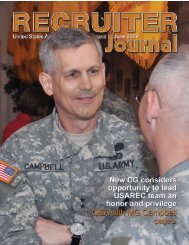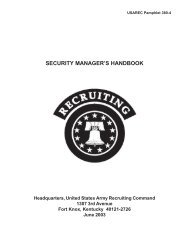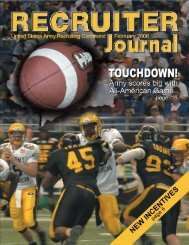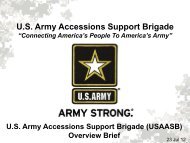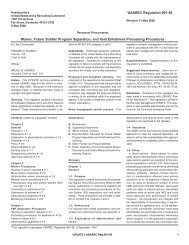19 Dec Cover.pmd - USAREC - U.S. Army
19 Dec Cover.pmd - USAREC - U.S. Army
19 Dec Cover.pmd - USAREC - U.S. Army
Create successful ePaper yourself
Turn your PDF publications into a flip-book with our unique Google optimized e-Paper software.
f. Have you identified the documentary and/or physical evidence necessary to complete your investigation?<br />
g. Have you identified the witnesses who must be questioned and ascertained their availability and willingness to<br />
provide sworn testimony?<br />
h. Do you have any possible personal disqualifications to relate to the appointing authority? Examples would be<br />
duty relationship, friendship with any witness, or being junior to any Soldier whose conduct reasonably may be in<br />
issue.<br />
i. Is an officer or civilian employee senior to you possibly guilty of dereliction of duty, or other violations of law<br />
or regulations? If so, report this immediately to the appointing authority.<br />
j. Have you identified who must receive a <strong>USAREC</strong> Form 722 (Privacy Act Statement) per paragraph 7c(4)?<br />
k. Have you identified which witnesses are suspected of criminal offenses, including violation of punitive <strong>Army</strong><br />
or <strong>USAREC</strong> regulations, and prepared their DA Form 3881 (Rights Warning Procedure/Waiver Certificate)?<br />
l. Have you prepared to conduct a thorough, impartial, and objective investigation?<br />
m. Will witnesses be interviewed in person? If not possible, by phone?<br />
n. Have you prepared areas of questioning?<br />
o. What order will witnesses be interviewed?<br />
p. Should the complainant be interviewed first?<br />
7. Conducting the investigation<br />
Once you are ready to begin the investigation, the following steps should be taken.<br />
a. Obtain any documentary or physical evidence that is available. In most recruiting impropriety (RI) cases this<br />
will include applicable documents from the applicant’s or Soldier’s guidance counselor resource center/electronic<br />
records management (GCRc/ERM) enlistment files and Contact History (if you need information that you cannot<br />
access, contact the applicable battalion executive officer (XO) to obtain such information for you). Court checks<br />
and medical records are other documents frequently required during RI investigations. Do not overlook statements<br />
previously provided to others by participants such as police reports, letters to commanders, and statements taken at<br />
the Military Entrance Processing Stations (MEPS). Examples of documents and interviews required for common<br />
allegations are at appendix B. Copies of all documents that assist in substantiating or refuting the allegation will be<br />
included as a part of the investigation.<br />
b. Review all documentary evidence and decide what witness statements you need. Identify personnel with whom<br />
you need to talk, what subject areas need to be discussed, and what questions you are going to ask. <strong>Dec</strong>ide in what<br />
order you will interview witnesses. In most cases the complainant should be interviewed first and the person against<br />
whom allegations have been made should be interviewed last. This ensures that the allegations are investigated<br />
thoroughly and that the person against whom the allegations have been made has an opportunity to refute or explain<br />
any adverse evidence. It is essential that you prepare in advance for each witness interview. What do you expect to<br />
learn from the witness? What subject areas need to be examined? By making notes in advance about these subject<br />
areas, you are less likely to forget an important area during the interview. Writing a list of questions in advance is<br />
not recommended. Such interviews tend to become too structured, and logical areas of further questioning are<br />
often overlooked or forgotten. A list of topics or subject areas is preferred. A short list of topics helps guide an<br />
interview and ensures that each area is examined completely before moving to the next area of questioning.<br />
c. Conduct witness interviews.<br />
(1) <strong>Dec</strong>ide the time and place of each witness interview. Coordinate the presence of military and civilian<br />
government employees with their supervisor. Because civilians not affiliated with <strong>Army</strong> or DoD are not under any<br />
obligation to provide a statement, you should strive to find a convenient time and place to conduct an interview and<br />
obtain a statement.<br />
(2) If you suspect a Soldier of violating the Uniform Code of Military Justice (UCMJ) (to include violation of a<br />
punitive regulation), you must read the Soldier his/her rights under Article 31, UCMJ. To avoid any problems,<br />
complete a DA Form 3881, have the Soldier make a selection to remain silent or make a statement, sign it, and<br />
attach it in the ROI. Do not advise military witnesses of their rights if they are not suspected of any offense. If in<br />
doubt as to whether it is necessary to read a witness their rights, call the BJA or legal advisor for guidance.<br />
(3) Before interviewing any civilians, including civilian employees of the United States, contractors, or nongovernment<br />
civilians, consult with your BJA or legal advisor. Your BJA or legal advisor will assist you in determining<br />
the status of the civilian(s) to be interviewed and the rules that will apply to each specific interview. The rules may<br />
vary so it is very important that you talk to your BJA or legal advisor in advance. Finally, if in doubt as to whether it<br />
2<br />
<strong>USAREC</strong> Pam 27-65 • 20 <strong>Dec</strong>ember 2012



